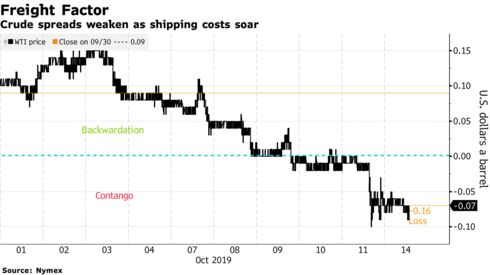
https://www.bloomberg.com/news/articles/2019-10-14/oil-spreads-weaken-as-freight-surge-menaces-world-s-crude-flows
-
Brent and WTI spreads decline as global shipping costs soar
-
Benchmark supertanker rates topped $300,000-a-day on Friday
The spectacular surge
in the cost of chartering oil tankers is rippling through the crude
market, as fears that shipments will be constrained begin to weigh on
gauges of market strength.
The
nearest WTI contract is trading at a discount to the following month --
a bearish market structure known as contango -- while its Brent
equivalent also slumped last week. The move reflected concerns that the
usual shipments of key grades of crude from the North Sea, Russia, West
Africa and the U.S. will be crimped, leaving an excess of oil with
nowhere to go, traders said.

“The
huge thing in the markets right now is the strong disruption on
freight,” said Olivier Jakob, managing director at consultant
Petromatrix GmbH. “That is limiting quite significantly the flows of
crude oil and that is putting some pressure on the time-spreads.”
Benchmark shipping rates surged to about $300,000 a day on Friday, while one vessel was booked for more than $15 million last week and Indian Oil Corp. said the costs oblige it to cut spot purchases.
The shift occurred following an attack on an Iranian oil tanker in the
Red Sea, which exacerbated U.S. sanctions on units of China’s COSCO
Shipping Corp. that had already clamped a chunk of the world’s fleet.
About 367,000 barrels-a-day of crude left the North Sea
heading to the lucrative Asian market in September, according to
ship-tracking data compiled by Bloomberg. About 1.2 million barrels of
U.S. crude was exported to Asia daily in July, about 45% of total
American exports, Energy Information Administration data show. Other
crude grades that are shipped on long-haul journeys to Asia include
Urals from Russia and oil from West Africa and the Middle East.
Freight-Based Slump
Though
traders said that the surge in freight was limiting the viability of
many of those trades, there’s only so long that situation is likely to
last. Middle East producers may discount their crude to persuade oil
refineries in Asia to take it instead of more local barrels, according
to Jan-Jacob Verschoor, London-based director of Oil Analytics Ltd.,
which keeps track of the margins of hundreds of refineries around the
world.
The premium for Brent December futures over the January contract fell
to as little as 25c early on Monday; that was the weakest level in just
over 2 months. At the same time, the nearest WTI time-spread reached a
bearish contango of as much as 10c on Friday, falling as much as 21c
from its highest level last week.
Though time-spreads often drop
seasonally in the fall as refinery maintenance lessens demand for crude,
the most recent slump is freight-based, said Tamas Varga, an analyst at
PVM Oil Associates.
“It’s all to do with the freight rates,” he said. “Refiners will have to draw down on their product stocks.”
No comments:
Post a Comment